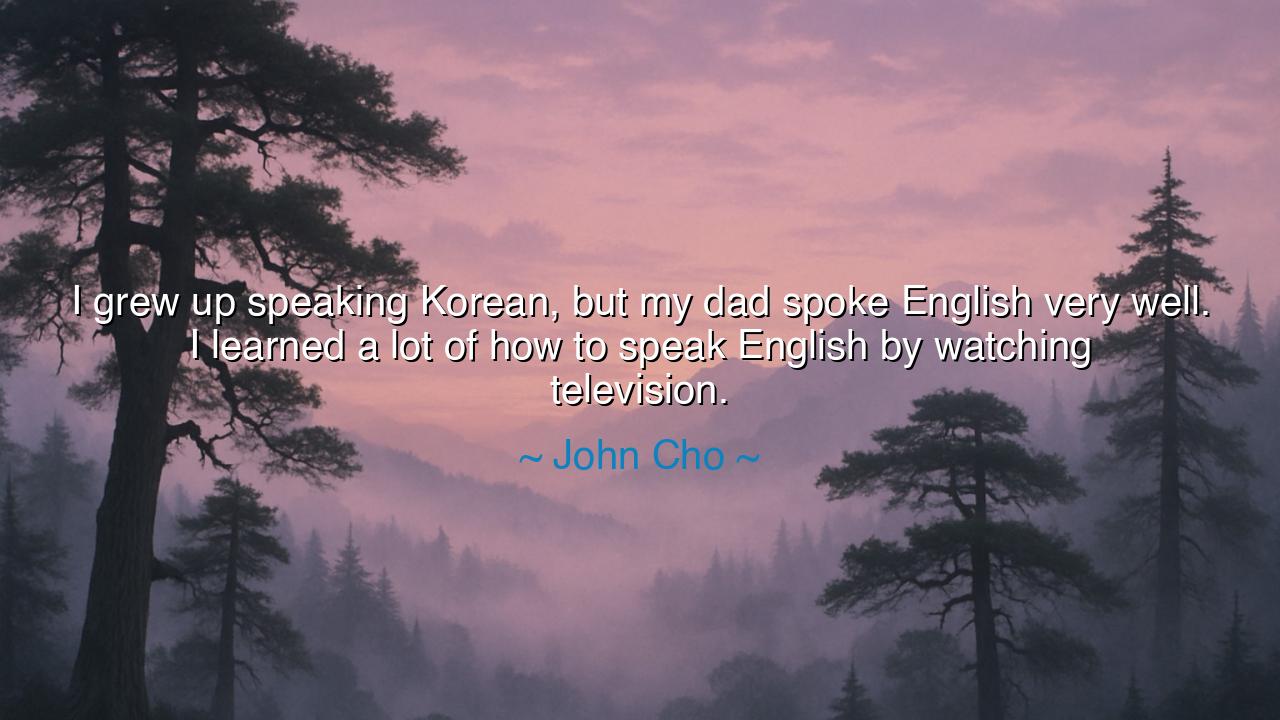
I grew up speaking Korean, but my dad spoke English very well. I
I grew up speaking Korean, but my dad spoke English very well. I learned a lot of how to speak English by watching television.






"I grew up speaking Korean, but my dad spoke English very well. I learned a lot of how to speak English by watching television." Thus spoke John Cho, the actor whose voice bridges two worlds — that of his heritage and that of his adopted home. In these words lies more than a memory of language; there is a testament to adaptation, perseverance, and the quiet heroism of identity. His story is not merely about learning words, but about finding one’s place in a world that demands transformation while testing one’s roots.
Language, my child, is more than speech — it is soul made audible. It carries the scent of one’s homeland, the rhythm of ancestors, the tone of belonging. To grow up speaking Korean in a foreign land is to live between two winds: one that whispers of the past, and one that beckons toward the future. The father, wise and strong, stood as the bridge — fluent in both worlds, guiding his son through the labyrinth of understanding. And the son, like countless children of immigrants before him, turned to whatever light he could find — the glowing screen, the flickering words, the cadence of English carried by strangers — and through that light, learned to speak, to dream, and to belong.
In the image of television, we see something profound: a modern form of mentorship, an unexpected teacher in the quiet hours. Where once the ancients learned from poets and oracles, John Cho learned from the rhythm of dialogue and the emotion of stories. Through the screen, he absorbed not just vocabulary, but culture, tone, and humanity. It was a kind of self-forging — the act of remaking one’s voice in the fire of necessity, of crafting identity from the pieces of two worlds that do not always fit easily together. This is the quiet nobility of the immigrant child: to listen, to imitate, to master, and to weave together old and new into something uniquely one’s own.
History, too, honors such stories. Consider Joseph Conrad, born in Poland, who did not learn English until adulthood, yet became one of the greatest English novelists of all time. His words, heavy with the rhythm of his foreign birth, brought new depth to the language he adopted. Like John Cho, Conrad understood that to live between languages is to live between worlds — and that this in-between space, though difficult, is rich with possibility. Such souls do not merely learn a language; they expand it, infusing it with new life.
John Cho’s story also speaks to the silent strength of the immigrant family. His father, who spoke English “very well,” carried the burden of translation — not only of words, but of life itself. He opened doors for his son, teaching him that survival in a new land requires not only work of the hands, but work of the tongue, of the mind, of the heart. The son’s learning from television was not rebellion or distance — it was continuation. It was the evolution of what his father began, a living tribute to the sacrifices of those who came before him.
There is a profound truth here: that identity is not fixed, but living. It grows and bends like a tree in two winds, and from that bending comes resilience. The child who must translate between languages learns empathy, learns to listen more deeply, to observe the subtleties others miss. To live in translation is to see the world through two eyes — one that remembers, and one that adapts. John Cho’s journey, like that of so many who straddle cultures, reminds us that the challenge of dual identity is not a weakness to overcome, but a strength to be honored.
So, my child, take this lesson to heart: when life places you between worlds, do not curse the distance — bridge it. When you must learn new words, speak them with the memory of the old. Let every tongue you know, every tradition you hold, become a thread in the fabric of your becoming. The past is your root; the present is your reach. Whether you learn from elders or from screens, from books or from struggle, learn with devotion — for every act of learning is an act of creation.
And remember this: to find your voice in a world that speaks many tongues is no small victory. It is an act of courage, of faith, of love — for in shaping your voice, you shape your destiny. As John Cho learned from the light of television and the wisdom of his father, so too can we all learn that language — whether spoken, lived, or felt — is the bridge between who we were and who we are becoming.






AAdministratorAdministrator
Welcome, honored guests. Please leave a comment, we will respond soon